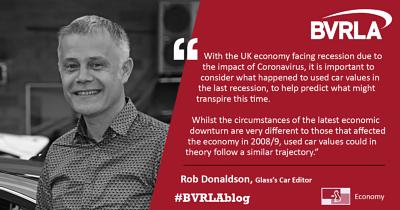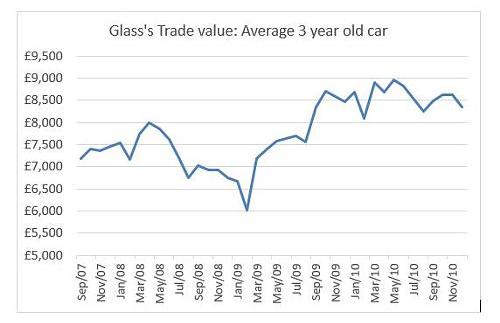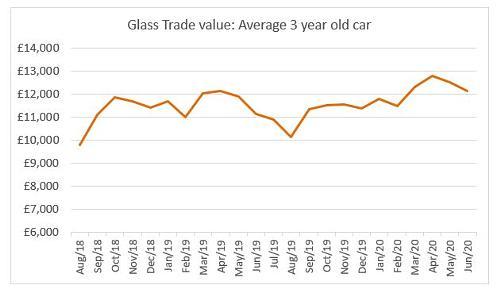Glass's Car Editor Rob Donaldson considers what happened to used car values in the 2008/9 recession, to help predict what might transpire if there's a recession due to the coronavirus pandemic.

With the UK economy facing recession due to the impact of Coronavirus, it is important to consider what happened to used car values in the last recession, to help predict what might transpire this time. Whilst the circumstances of the latest economic downturn are very different to those that affected the economy in 2008/9, used car values could in theory follow a similar trajectory.

The chart above shows the average Glass’s Trade values for three-year-old cars. Back in 2007 when the subprime mortgage difficulties began in the USA, average used car values in the UK fluctuated between £7,000 and £7,500, rising to £8,000 into 2008. As the financial difficulties with banks increased during summer 2008, values fell nearly 20%, although this included a degree of normal seasonality. In the autumn 2008, as the collapse of Lehman Brothers in the USA threatened a run on the banks, the global financial crisis started to take hold. In the UK, the average value of a used three-year-old car continued falling, on average by another 15% to £6,000 into the New Year of 2009.
However, with the help of UK government stimulus financial catastrophe was averted, and confidence started to return to the economy. At this time, as the recession lingered and disposable income dropped, many consumers switched from buying new cars to buying used cars. This created increased demand for used cars and values began increasing rapidly, with the average value of a three-year-old used car rising almost 50% over the following 12 months, way beyond their previous peak, to nearly £9,000.
A perfect storm – Coronavirus and Brexit
Moving forward to today, although there is no doubt that the UK will experience another recession, the dynamics in the car market are different. This time, there has been a very quick and almost complete shutdown of the market for both new and used cars, with just seasonal variations in values taking place, as shown in the chart below.

The Glass’s Editorial team are confident that UK values will be more resilient than the rest of Europe. With the current data, and assessing data from the Global Financial Crisis, the UK market has the potential to come back strongly and relatively quickly. As an island that drives on the left, there will be specific supply constraints for the UK which will continue to affect the availability of new cars.
The supply of new cars could be further curtailed as we negotiate the UK trade deals with Europe. These trade deals are likely to negatively affect the Euro / Pound Exchange rate, further increasing the price of new cars, whilst at the same time positively affecting the demand for used cars.
As unemployment continues to rise the makeup of the demand in the automotive market is likely to change with it. Firstly, additional unemployment is likely to force a further contraction in the new car market. Conversely, this is likely to increase demand in the used car market again strengthening the recovery of used car values, last witnessed, as already discussed, during the 2008 Global Financial Crisis.
Next steps for the industry
In reality it is still unclear where values will head now that dealers have opened their doors following the easing of the shutdown. A reasonable assumption is that most dealers will try to hold their advertised prices, offering little discount. However, with static cash flow for the past 12 weeks, getting a deal done may win the day.
On the positive side there is no doubt there will be some pent-up demand for both new and used cars, but this may ebb away quickly, especially in the new car arena as unemployment rises after the furlough scheme ends with consumers likely to tighten their belts. That said, transport is a necessity for many and whilst using public transport is unappealing at this time, demand for used cars, especially the cheaper end of the market, could stay strong throughout the recession.
Additionally, new car registrations have been in decline for two years prior to the coronavirus pandemic. This will directly negatively affect the supply of used cars and is likely to lead to stronger used car values moving forward.
This is a critical time for the UK automotive market. Although the volatility witnessed during the Global Financial Crisis is not expected, the short-term outlook is uncertain. Overall, we anticipate that there will be a fall in values in 2020 and 2021 with recovery in 2022. The majority of these falls will be driven by the economic effects of Covid-19 coupled to Brexit driving lower demand in the UK market.





